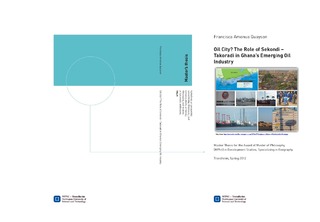| dc.contributor.advisor | Jørgensen, Stig Halvard | nb_NO |
| dc.contributor.author | Quayson, Francisca Amonua | nb_NO |
| dc.date.accessioned | 2014-12-19T14:26:19Z | |
| dc.date.available | 2014-12-19T14:26:19Z | |
| dc.date.created | 2013-06-05 | nb_NO |
| dc.date.issued | 2012 | nb_NO |
| dc.identifier | 625918 | nb_NO |
| dc.identifier.uri | http://hdl.handle.net/11250/265500 | |
| dc.description.abstract | Ghana’s recent oil discovery in 2007 has brought with it anticipation for economic growth. Subsequently, there have been policies that seek to guide various aspects of the industry.
This study explores the socio-economic and infrastructural role that Sekondi-Takoradi, the nearest big city to the Jubilee oil field, is playing to facilitate oil activities offshore, although it has no formal government recognition as Ghana’s oil city.
Cluster theory and structural functionalist theory are used together with the concepts of cities and infrastructure to analyze results.
The study uses the snowballing method to select 23 informants from a network of oil companies and oil service providers, government institutions and relevant associations. Interview guides were used to obtain primary data while observation and figures were used for elaboration.
Findings indicate that Sekondi-Takoradi is evolving as a location for an oil industry cluster. Intense horizontal and vertical linkages between firms in the core oil industry and with other supporting businesses show characteristics of an industrial cluster.
The city transportation and social infrastructure helps with the coordination of offshore and onshore activities albeit to a limited extent due to the lack of governmental policy intervention, urban primacy and inadequate infrastructural development.
Local businesses are limited to the periphery of the oil supply chain due to their size, capacity and the general preference of oil companies for larger suppliers and companies.
It is prudent for government and local planning authorities to formally recognize the city’s role and expand its infrastructural base to adequately support the industry. Local participation (businesses and labour) can be increased through capital investment, training and enforcement of local content policy goals to facilitate the anticipated economic growth. | nb_NO |
| dc.language | eng | nb_NO |
| dc.publisher | Norges teknisk-naturvitenskapelige universitet, Fakultet for samfunnsvitenskap og teknologiledelse, Geografisk institutt | nb_NO |
| dc.title | Oil City? The Role of Sekondi –Takoradi in Ghana’s Emerging Oil Industry | nb_NO |
| dc.type | Master thesis | nb_NO |
| dc.contributor.department | Norges teknisk-naturvitenskapelige universitet, Fakultet for samfunnsvitenskap og teknologiledelse, Geografisk institutt | nb_NO |
